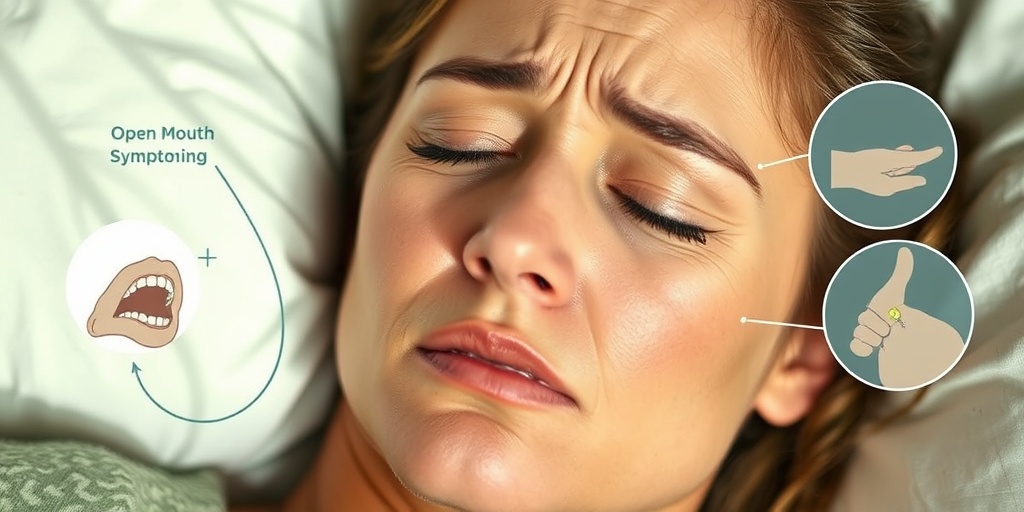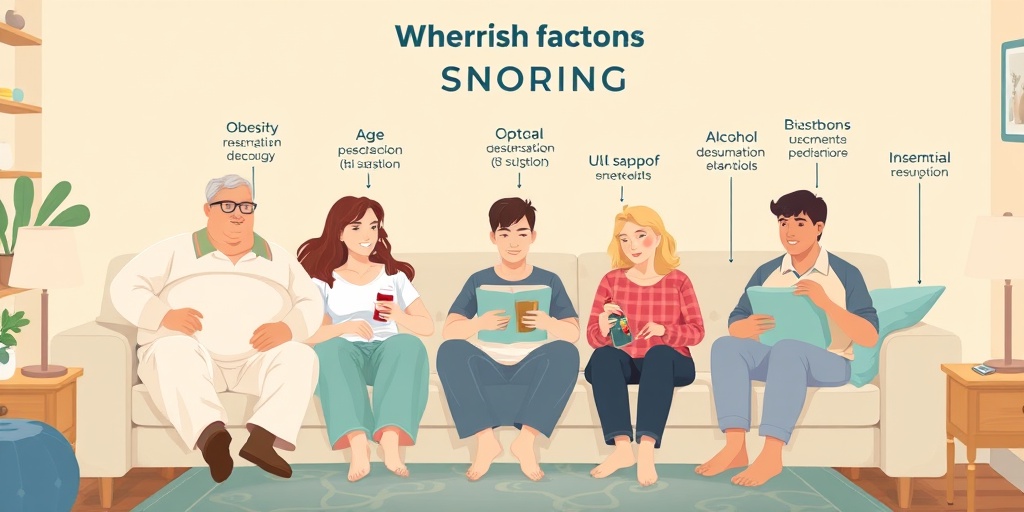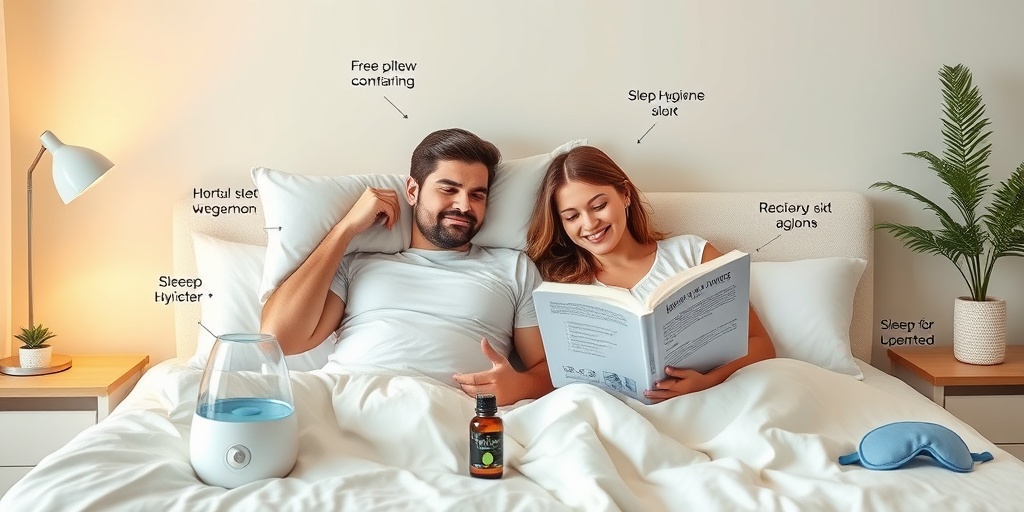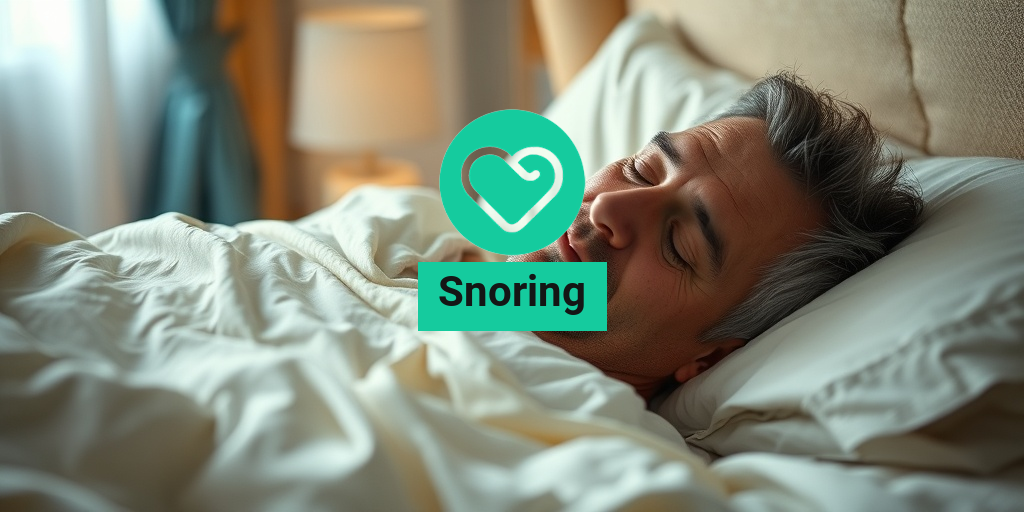What Is Snoring?
Snoring is a common phenomenon that occurs when airflow through the mouth and nose is partially obstructed during sleep. This obstruction can lead to vibrations of the throat tissues, producing the characteristic sound we associate with snoring. While it may seem like a harmless annoyance, snoring can sometimes indicate underlying health issues, such as sleep apnea, which can have serious implications for overall health.
Understanding the Mechanics of Snoring
To grasp what snoring is, it’s essential to understand how it happens. When we sleep, the muscles in our throat relax. If the airway becomes narrowed or blocked, the airflow is disrupted, causing the soft tissues in the throat to vibrate. This vibration produces the sound of snoring. Factors that contribute to this obstruction include:
- Obesity: Excess weight can lead to increased fatty tissue around the neck, narrowing the airway.
- Alcohol Consumption: Alcohol relaxes the throat muscles, increasing the likelihood of snoring.
- Sleep Position: Sleeping on your back can cause the tongue to fall backward, blocking the airway.
- Age: As we age, the throat muscles become weaker, making snoring more likely.
Common Misconceptions About Snoring
Many people believe that snoring is merely a nuisance, but it can be a sign of more serious health issues. For instance, sleep apnea is a condition where breathing repeatedly stops and starts during sleep, often accompanied by loud snoring. If you or a loved one experiences excessive daytime sleepiness, it may be time to consult a snoring doctor or sleep specialist.
Snoring Symptoms
Identifying the symptoms of snoring is crucial for understanding its impact on your health and well-being. While snoring itself is the most apparent symptom, there are several associated signs that may indicate a more serious condition.
Primary Symptoms of Snoring
The primary symptom of snoring is, of course, the sound itself. However, other symptoms may include:
- Loud Snoring: This can be disruptive not only to the snorer but also to anyone sharing the same sleeping space.
- Choking or Gasping: This may occur during sleep, indicating possible sleep apnea.
- Daytime Sleepiness: If snoring is affecting your sleep quality, you may feel excessively tired during the day.
- Morning Headaches: Frequent headaches upon waking can be a sign of disrupted sleep due to snoring.
When to Seek Help
If you or someone you know experiences any of the following symptoms, it may be time to seek professional help:
- Frequent Loud Snoring: If snoring is loud enough to disturb others regularly.
- Choking or Gasping: If you notice these episodes during sleep.
- Excessive Daytime Sleepiness: If you find it hard to stay awake during the day.
- High Blood Pressure: Snoring can contribute to hypertension, so monitoring your blood pressure is essential.
For those looking for solutions, there are various snoring treatments available, including snoring mouthpieces, nasal strips, and even lifestyle changes. If you’re interested in exploring these options, consider visiting Yesil Health AI for evidence-based health answers and personalized advice.
In conclusion, understanding what snoring is and recognizing its symptoms can help you take proactive steps toward better sleep and overall health. Don’t let snoring disrupt your life—take action today! 😴✨

Common Causes of Snoring
Snoring is a common issue that affects millions of people worldwide. Understanding the causes of snoring can help you identify potential solutions and improve your sleep quality. Here are some of the most prevalent causes:
1. Obstructed Airways
One of the primary reasons for snoring is the obstruction of airways during sleep. This can occur due to:
- Enlarged tonsils or adenoids: Particularly common in children, enlarged tonsils can block airflow.
- Nasal congestion: Allergies, colds, or sinus infections can lead to nasal blockages, making it difficult to breathe through the nose.
- Deviated septum: A structural issue in the nose can cause uneven airflow, leading to snoring.
2. Sleep Position
Your sleeping position can significantly impact whether you snore. Sleeping on your back can cause the tongue to fall backward into the throat, narrowing the airway. This is why many people find that they snore less when they sleep on their sides.
3. Age
As we age, the throat muscles become weaker, which can lead to increased snoring. Older adults are more likely to experience snoring due to the natural decline in muscle tone.
4. Lifestyle Factors
Certain lifestyle choices can contribute to snoring:
- Obesity: Excess weight, especially around the neck, can put pressure on the airway, leading to snoring.
- Alcohol consumption: Drinking alcohol before bed can relax the throat muscles, increasing the likelihood of snoring.
- Smoking: Smoking irritates the mucous membranes in the throat, leading to inflammation and snoring.
5. Medical Conditions
Some medical conditions can also cause snoring. Sleep apnea, for example, is a serious condition characterized by repeated interruptions in breathing during sleep. This can lead to loud snoring and requires medical attention. Other conditions include:
- Allergies: Allergies can cause nasal congestion, leading to snoring.
- Hypothyroidism: An underactive thyroid can contribute to weight gain and snoring.
Risk Factors for Snoring
While snoring can affect anyone, certain factors can increase the likelihood of experiencing this disruptive sleep issue. Understanding these risk factors for snoring can help you take proactive steps to mitigate them.
1. Gender
Men are more likely to snore than women, primarily due to anatomical differences. Men typically have narrower air passages, which can lead to increased snoring. However, women can also snore, especially after menopause when hormonal changes can affect muscle tone.
2. Family History
If snoring runs in your family, you may be more predisposed to it. Genetic factors can influence the structure of your airways and the likelihood of snoring.
3. Weight
Being overweight is a significant risk factor for snoring. Extra fat around the neck can put pressure on the airway, leading to obstruction during sleep. Maintaining a healthy weight through diet and exercise can help reduce snoring.
4. Smoking and Alcohol Use
Both smoking and alcohol consumption can exacerbate snoring. Smoking irritates the throat and nasal passages, while alcohol relaxes the muscles in the throat, increasing the chances of airway obstruction. Reducing or eliminating these habits can lead to better sleep quality.
5. Sleep Disorders
Individuals with sleep disorders, such as sleep apnea, are at a higher risk of snoring. Sleep apnea is characterized by repeated pauses in breathing during sleep, often accompanied by loud snoring. If you suspect you have sleep apnea, it’s essential to consult a healthcare professional.
6. Allergies and Respiratory Issues
Allergies, colds, and other respiratory issues can lead to nasal congestion, making it difficult to breathe through the nose. This can result in snoring, especially during allergy season or when you have a cold. Using nasal strips or other anti-snoring devices may help alleviate this issue.
By understanding the common causes and risk factors associated with snoring, you can take steps to address the issue and improve your sleep quality. Whether it’s through lifestyle changes, medical interventions, or the use of anti-snoring devices, there are various options available to help you and your loved ones enjoy a quieter night’s sleep. 🌙😴

Snoring and Sleep Apnea
Snoring is a common issue that affects millions of people worldwide, but it can sometimes be a sign of a more serious condition known as sleep apnea. Understanding the relationship between snoring and sleep apnea is crucial for anyone who snores or shares a bed with someone who does.
What is Sleep Apnea?
Sleep apnea is a sleep disorder characterized by repeated interruptions in breathing during sleep. These interruptions can last for a few seconds to minutes and may occur dozens or even hundreds of times a night. The most common type is obstructive sleep apnea (OSA), which occurs when the muscles in the throat relax excessively, blocking the airway.
How Snoring Relates to Sleep Apnea
While not everyone who snores has sleep apnea, loud and frequent snoring can be a significant indicator of the condition. Here are some key points to consider:
- Snoring as a Symptom: Many individuals with sleep apnea snore loudly, often accompanied by gasping or choking sounds as they struggle to breathe.
- Risk Factors: Factors such as obesity, age, and anatomical features (like a thick neck or enlarged tonsils) can increase the likelihood of both snoring and sleep apnea.
- Health Risks: Untreated sleep apnea can lead to serious health issues, including cardiovascular problems, high blood pressure, and daytime fatigue.
Recognizing the Signs
If you or a loved one snores, it’s essential to be aware of the signs that may indicate sleep apnea:
- Frequent loud snoring
- Choking or gasping during sleep
- Excessive daytime sleepiness
- Morning headaches
- Difficulty concentrating
If you notice these symptoms, it may be time to consult a snoring doctor or a sleep specialist for further evaluation.
Diagnosis of Snoring Issues
Diagnosing snoring issues, especially when they may be linked to sleep apnea, involves a comprehensive approach. Here’s what you can expect during the diagnostic process:
Initial Consultation
Your journey typically begins with an initial consultation with a healthcare provider. During this visit, you’ll discuss:
- Your snoring patterns and frequency
- Any observed symptoms of sleep apnea
- Your medical history and lifestyle factors
Sleep Studies
To accurately diagnose sleep apnea, your doctor may recommend a sleep study, which can be conducted in a sleep lab or at home. This study monitors:
- Your breathing patterns
- Oxygen levels in your blood
- Heart rate
- Brain activity
- Body movements
These tests help determine the severity of your snoring and whether it is linked to sleep apnea.
Additional Diagnostic Tools
In some cases, your doctor may use additional diagnostic tools, such as:
- Polysomnography: A comprehensive sleep study that records various body functions during sleep.
- Home Sleep Apnea Testing: A simplified version of polysomnography that can be done in the comfort of your home.
- Physical Examination: A thorough examination of your throat, mouth, and nasal passages to identify any anatomical issues contributing to snoring.
Understanding Your Results
Once the tests are completed, your healthcare provider will review the results with you. If sleep apnea is diagnosed, they will discuss treatment options, which may include:
- CPAP Therapy: A continuous positive airway pressure device that keeps your airway open during sleep.
- Oral Appliances: Devices like a snoring mouthpiece or snoring mouth guard that help keep your airway open.
- Lifestyle Changes: Weight loss, avoiding alcohol, and changing sleep positions can significantly reduce snoring and improve sleep quality.
Understanding the connection between snoring and sleep apnea is vital for effective treatment and improved health. If you suspect that your snoring may be more than just a nuisance, don’t hesitate to seek professional advice. 💤

Effective Treatments for Snoring
Snoring is a common issue that affects millions of people worldwide. It can disrupt sleep for both the snorer and their partner, leading to fatigue and irritability. Fortunately, there are several effective treatments available to help stop snoring and improve sleep quality. Let’s explore some of the most popular options.
1. Lifestyle Changes
Making simple lifestyle adjustments can significantly reduce snoring. Here are some effective changes to consider:
- Weight Management: Excess weight, especially around the neck, can contribute to snoring. Losing even a small amount of weight can help alleviate the problem.
- Avoiding Alcohol: Alcohol relaxes the throat muscles, increasing the likelihood of snoring. Try to avoid alcohol consumption, especially before bedtime.
- Sleep Position: Sleeping on your back can cause the tongue to fall back into the throat, leading to snoring. Try sleeping on your side instead.
2. Anti-Snoring Devices
There are various anti-snoring devices designed to help keep the airways open during sleep:
- Snoring Mouthpieces: These devices reposition the jaw and tongue to keep the airway clear. They can be custom-fitted by a dentist or purchased over-the-counter.
- Snoring Strips: Nasal strips can help open the nostrils, improving airflow and reducing snoring. They are easy to use and can be a quick fix for mild snoring.
- CPAP Machines: For those with sleep apnea, a Continuous Positive Airway Pressure (CPAP) machine can be a lifesaver. It keeps the airway open by providing a steady stream of air.
3. Home Remedies
In addition to lifestyle changes and devices, several home remedies can help reduce snoring:
- Humidifiers: Keeping the air moist can help reduce nasal congestion, which may contribute to snoring.
- Essential Oils: Some people find relief by using essential oils like eucalyptus or peppermint, which can help clear nasal passages.
- Throat Exercises: Strengthening the muscles in the throat through specific exercises can help reduce snoring. Try singing or practicing specific vocal exercises.
4. Medical Treatments
If snoring persists despite trying various treatments, it may be time to consult a snoring doctor. They can evaluate for underlying conditions such as sleep apnea and recommend appropriate medical interventions:
- Surgery: In some cases, surgical options may be necessary to remove excess tissue or correct structural issues in the airway.
- Medication: If allergies or nasal congestion are contributing to snoring, medications may help alleviate these symptoms.
Preventing Snoring at Home
Preventing snoring is often easier than treating it. Here are some effective strategies to implement at home:
1. Create a Sleep-Friendly Environment
Ensure your bedroom promotes restful sleep. Consider the following:
- Comfortable Bedding: Invest in a good quality mattress and pillows that support your neck and head properly.
- Temperature Control: Keep the room at a comfortable temperature to promote better sleep.
- Noise Reduction: Use white noise machines or earplugs to block out disruptive sounds.
2. Maintain a Consistent Sleep Schedule
Going to bed and waking up at the same time every day can help regulate your sleep patterns. This consistency can lead to deeper, more restorative sleep, reducing the likelihood of snoring.
3. Stay Hydrated
Dehydration can lead to thicker mucus in the throat, which can contribute to snoring. Make sure to drink plenty of water throughout the day to stay hydrated.
4. Avoid Heavy Meals Before Bed
Eating large meals close to bedtime can increase the likelihood of snoring. Aim to finish eating at least two to three hours before going to sleep.
By implementing these strategies and exploring various treatments, you can effectively manage and prevent snoring, leading to better sleep for you and your loved ones. 🌙💤

Frequently Asked Questions about Snoring
What is snoring?
Snoring is the sound produced when airflow through the mouth and nose is partially obstructed during sleep. This can occur due to various factors, including the position of the tongue, throat muscles, and nasal passages.
What causes snoring?
There are several snoring causes, including:
- Obstructed nasal airways
- Excess weight
- Alcohol consumption
- Sleep position
- Age-related changes in throat muscle tone
How can I stop snoring?
If you’re looking to stop snoring, consider the following methods:
- Change your sleep position
- Use snoring strips or nasal strips
- Try an anti snoring device or mouthpiece
- Maintain a healthy weight
- Avoid alcohol before bedtime
What are some effective snoring remedies?
Some popular snoring remedies include:
- Using a snoring pillow designed to keep your head elevated
- Implementing a humidifier in your bedroom
- Practicing throat exercises to strengthen muscles
When should I see a doctor about snoring?
If snoring is accompanied by symptoms such as gasping for air during sleep, excessive daytime sleepiness, or if it disrupts your partner’s sleep, it may be time to consult a snoring doctor. These could be signs of a more serious condition like sleep apnea.
Can pets snore too?
Yes, both dogs and cats can snore. Just like humans, their snoring can be caused by similar factors such as their sleeping position or any nasal obstructions.
Are there any specific devices to help with snoring?
Yes, there are various snoring devices available, including:
- Snoring mouthpieces
- CPAP machines for those diagnosed with sleep apnea
- Mouth tape for snoring to encourage nasal breathing
What should I do if my baby is snoring?
If your baby is snoring, it’s important to monitor the situation. Occasional snoring can be normal, but if it’s frequent or accompanied by other symptoms, consult a pediatrician to rule out any underlying issues.
Can snoring be treated with lifestyle changes?
Absolutely! Many lifestyle changes can help reduce or eliminate snoring, such as:
- Maintaining a healthy weight
- Staying hydrated
- Avoiding smoking
What are snoring mouth guards and how do they work?
Snoring mouth guards are devices worn during sleep to help keep the airway open. They work by repositioning the jaw and tongue to prevent obstruction of the throat.
Is there a connection between snoring and sleep apnea?
Yes, there is a significant connection. Snoring can be a symptom of sleep apnea, a serious condition where breathing repeatedly stops and starts during sleep. If you suspect you have sleep apnea, seek medical advice.
Can I use nasal strips for snoring?
Yes, nasal strips can be effective for some individuals. They work by physically opening the nostrils to improve airflow, which can help reduce snoring caused by nasal congestion.
What are the lyrics to “It’s Raining, It’s Pouring, The Old Man is Snoring”? 🎶
The lyrics are a popular nursery rhyme that goes: “It’s raining, it’s pouring, the old man is snoring. He went to bed and bumped his head, and couldn’t get up in the morning.” This playful rhyme humorously highlights the theme of snoring!




